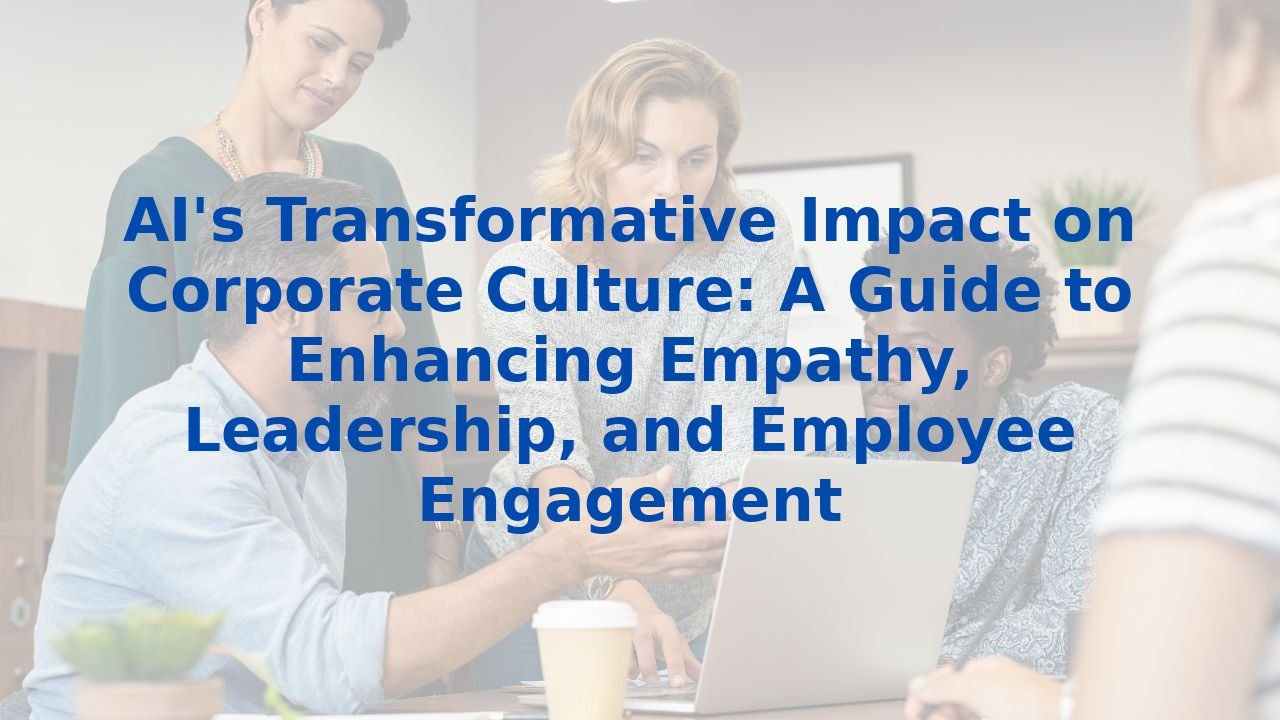AI's Transformative Impact on Corporate Culture: A Guide to Enhancing Empathy, Leadership, and Employee Engagement
AI's Transformative Impact on Corporate Culture: A Guide to Enhancing Empathy, Leadership, and Employee Engagement
Introduction
In an era characterized by rapid technological advancement, Artificial Intelligence (AI) is not just a tool for automation; it is a catalyst for profound cultural transformation within organizations. As companies pivot to embrace AI, they unlock a multitude of opportunities to enhance corporate culture, nurture empathy, redefine leadership, and elevate employee engagement. In this guide, we’ll explore how AI revolutionizes these crucial aspects of corporate life while improving overall efficiency.
AI and Corporate Culture
The digital age is redefining corporate culture by fostering environments grounded in innovation and collaboration. AI facilitates this change by employing advanced analytics and natural language processing (NLP) to capture the pulse of employee sentiment and feedback. By systematically analyzing conversations and interactions, organizations can uncover hidden patterns, identify communication barriers, and create a more inclusive culture. Such insight empowers HR departments to foster environments where every voice is valued, establishing a workplace marked by transparency and trust.
AI and Empathy
In the corporate realm, empathy is paramount. AI is enhancing empathy in the workplace through automated communication tools like chatbots and virtual assistants that bridge gaps between employees and management. These technologies facilitate seamless interactions and encourage open dialogue, cultivating a supportive company culture. Remarkably, AI analytics can pinpoint areas lacking in empathy, providing an opportunity for organizations to implement targeted solutions that uplift morale and improve workplace dynamics.
AI and Leadership
The landscape of leadership is evolving, with AI equipping leaders with data-driven insights that drive strategic decision-making. By harnessing the power of real-time analytics, leaders can rapidly adapt to employee needs, ultimately fostering a more engaged workforce. This intelligence not only leads to more informed decisions but also nurtures a culture of responsiveness and fulfillment among team members — a necessary ingredient for effective leadership.
AI and HR Strategy
AI is revolutionizing HR strategies, automating mundane tasks such as recruitment, payroll, and administrative duties. This automation allows HR professionals to redirect their efforts toward high-impact initiatives that enhance employee experiences and organizational effectiveness. Moreover, AI's predictive analytics can foresee challenges, enabling HR teams to proactively address potential issues, resulting in a more harmonious and engaged workforce.
AI and Employee Engagement
Employee engagement is the heart of any successful organization. AI enhances this vital element by personalizing learning experiences and streamlining communication channels. Imagine AI-driven training programs that adapt to individual learning styles, tailoring content based on an employee's specific needs. Such innovations result in heightened productivity and job satisfaction, creating a win-win situation for both employees and organizations. Real-time feedback mechanisms powered by AI also contribute to immediate performance improvements and ongoing employee development.
The Importance of Training Employees for AI
While the benefits of AI are manifold, training employees to navigate this new landscape is essential for maximizing impact. Comprehensive training programs ensure that employees not only become adept in utilizing AI tools but also understand the ethical implications that accompany AI's integration into corporate life. By fostering an informed workforce, organizations can promote a culture of responsibility and innovation, empowering employees to embrace AI as a collaborative partner in their professional journey.
Conclusion
AI is more than a technological advancement; it is a transformative force reshaping corporate culture, empathy, leadership, HR strategy, and employee engagement. By leveraging AI, organizations can streamline processes, enhance employee satisfaction, and make informed strategic choices. In this era of digital collaboration, arming employees with AI skills is not just beneficial; it is imperative. As businesses continue to adapt, the integration of AI will define the future of work, creating environments that foster both human connection and technological proficiency.
Embrace AI not just as a tool, but as a transformative ally in your corporate journey.
Through dedicated efforts to train your workforce in AI competencies, organizations can lead the charge into a future where technology and human-centric values coexist harmoniously.



